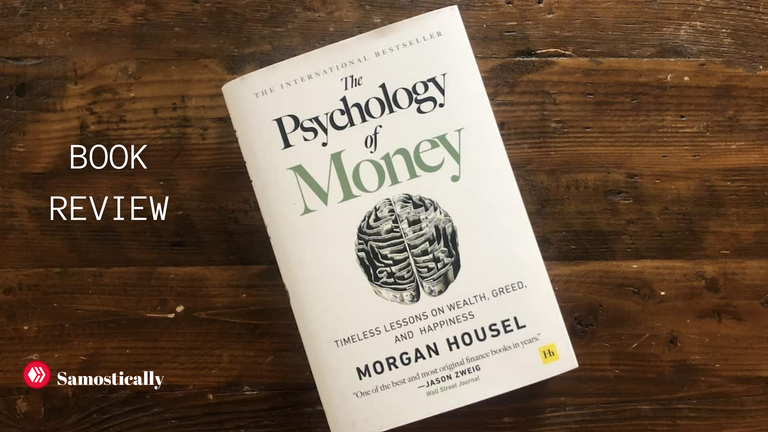
Image Source | Edited with Canva
Still on the non-fiction spree ...
I intend to devour as many books as possible this year, to help me gain more insight into how to better improve my life.
I have heard a lot of successful people give advice and one thing they never fail to mention is reading books.
One can not go wrong with reading non-fiction books.
Today I will be reviewing: The Psychology of Money by Morgan Housel.
This book was recommended to me by a close friend of mine. Getting money is one thing, retaining wealth is another. More often than not, I have seen so many young men go from being rich to having nothing. Even I have fallen victim to mismanaging funds.
What causes this? And how can I prevent myself from making such mistakes?
These are some of the questions that led to my discovery of The Psychology of Money by Morgan Housel.

About The Psychology of Money
The Psychology of Money by Morgan Housel is an exploration of how our attitudes, beliefs, and behaviors shape our financial outcomes.
The author uses real-world examples and practical advice to illustrate how small changes in our financial habits and mindset can lead to significant long-term gains.
The book covers a wide range of issues, including the role of luck, the significance of being reasonable, the impact of hidden costs, and the power of compound interest. The book's easy language and realistic examples make it suitable for readers of all financial literacy levels.
After taking some time out to read this book, I believe The Psychology of Money is an excellent resource for anyone seeking to improve their financial decision-making skills and achieve better financial security and success.
Acquiring wealth and retaining wealth are two different things
I used to think that those who could not retain wealth were either not smart enough or knowledgeable enough in the field of finance. But this book has made me see that this is not the case. Being smart has little to do with one's ability to retain wealth but has to do more with our behavior towards money and this can vary drastically from person to person as we all have a variety of life experiences that directly influences our behavior and financial actions.
The Psychology of Money addresses the influence of personal experiences and relationships on financial decisions. Housel encourages readers to be aware of these influences and make conscious, informed decisions that align with their values and priorities.

My key takeaways from the book include:
Luck plays a significant role in financial outcomes, and it's important to recognize and appreciate the role of luck in our own lives.
Being rational is important, but being reasonable is often a better approach to financial decision-making. It's important to recognize our limitations and biases and make decisions that are reasonable based on our circumstances.
Being prepared for unexpected events can help mitigate their impact. Having a financial plan and being flexible in adapting to unexpected events can help ensure financial stability and security.
Leaving room for error is important when making financial decisions. It's important to aim for high returns and take calculated risks, but also important to have a margin of safety in case things don't go as planned.
Our values, priorities, and goals can change over time, and it's important to adjust our financial plans accordingly. Flexibility and adaptability are key to successful financial planning.
Hidden costs and fees can have a significant impact on financial outcomes, and it's important to be aware of these costs and factor them into decision-making.
Our personal experiences and relationships can influence our financial decisions, and it's important to be aware of these influences and make conscious, informed decisions.
Saving is a means to an end, not an end in itself. It's important to align our saving habits with our values and priorities and use savings to achieve our goals.
Compound interest is a powerful tool for achieving long-term financial success, and small, consistent investments made over a long period can lead to substantial wealth.
A long-term perspective is essential to successful investing. It's important to avoid short-term thinking and focus on long-term goals.
Avoiding debt can be a key component of achieving financial stability and success. Debt can be a burden that limits options and creates stress.
It's important to avoid making emotional decisions when it comes to investing. Emotions can lead to irrational decision-making and poor financial outcomes.
Frugality can be a powerful tool for achieving financial goals, but it's important to find a balance between saving and enjoying life.
Risk is an essential component of investing, but it's important to take calculated risks and avoid unnecessary risks.
Financial success is not just about making money, but also about managing money effectively. Effective money management can lead to long-term financial stability and success.
Building wealth is not just about making good financial decisions, but also about avoiding costly mistakes.
Money is not just about math, but also about psychology. Understanding the psychological factors that influence financial decision-making is essential to achieving financial success.
My Thoughts on the book
Should I read it?
YES!
I recommend this book to anyone who wishes to be more financially aware.
Regardless of where you are in life financially, I would assume everyone wants the ability to retain whatever wealth they attain. This book can help you.
The book provides a valuable resource for anyone looking to improve their financial decision-making and achieve greater financial security and success.
Interested in personal finance and the psychology of money?
I highly recommend The Psychology of Money by Morgan Housel. You can get the book here


I am @samostically,I love to talk and write about chess because i benefited alot from playing chess. I love to review books and movies too!.I believe life is all about staying happy and maintaining peace.
♟♟♟♟♟♟♟♟♟

The rewards earned on this comment will go directly to the people( @samostically ) sharing the post on Twitter as long as they are registered with @poshtoken. Sign up at https://hiveposh.com.
Congratulations @samostically! You have completed the following achievement on the Hive blockchain And have been rewarded with New badge(s)
Your next payout target is 9000 HP.
The unit is Hive Power equivalent because post and comment rewards can be split into HP and HBD
You can view your badges on your board and compare yourself to others in the Ranking
If you no longer want to receive notifications, reply to this comment with the word
STOPTo support your work, I also upvoted your post!
Check out our last posts:
Support the HiveBuzz project. Vote for our proposal!
You review is now featured on the The Psychology of Money: Timeless lessons on wealth, greed, and happiness book page on Hive!
Were you aware that it is possible to set up a personal bookstore in your Hive profile by clicking heart icon on your favorite books? Samostically (waivio.com)
There is reasonable evidence that this article is machine-generated. Posting such content is considered fraud.
Fraud is discouraged by the community and may result in the account being Blacklisted.
Guide: Why and How People Abuse and Defraud
If you believe this comment is in error, please contact us in #appeals in Discord.